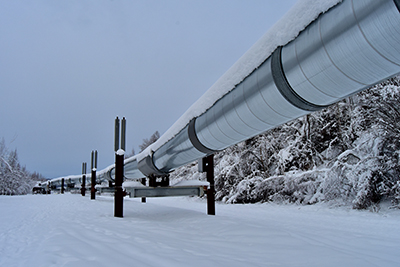"Drill, baby, drill," says Trump: Oil drilling is allowed in Alaska, USA. But so far, no energy company has applied for licenses.


There are nicer business trips, purely weather-wise, than Northwest Alaska. But when Donald Trump calls "drill, baby, drill," which in America is a code word for the unlimited exploitation of fossil fuels, Doug Burgum (Secretary of the Interior), Chris Wright (Secretary of Energy), and Lee Zeldin, head of the Environmental Protection Agency (EPA), put on their parkas and jet off to where grizzly bears, caribou, thousands of migratory birds, and other wild animals live: in the "National Petroleum Reserve," a 23-million-hectare area located about 600 miles north of Anchorage. The reserve was established in the early 20th century. In 1976, Congress authorized full commercial development, with the stipulation that oil production must be harmonized with nature and wildlife conservation. This has never been achieved so far.
This week, the three cabinet members of the US government announced a highly controversial change of course: Trump intends to quickly open the largest contiguous area of land in the United States to oil and gas exploration. The corresponding restrictions imposed by previous President Joe Biden have already been partially relaxed.
The Trump trio was now tasked with promoting the development to industry representatives in the freezing cold. Burgum declared that Biden's order "undermines our ability to harness domestic resources at a time when America's energy independence has never been more important." He failed to mention that the US is already the world's largest oil and gas producer.
"Prosperity" Energy Secretary Wright added: "Unleashing American energy goes hand in hand with unleashing American prosperity." Critics point to warnings that make Trump's undertaking seem problematic: The 19-million-hectare area is one of the last truly pristine tracts of land in the United States. The Gwich'in, an Alaska Native group, considers it sacred.
However, the bidding process, from which the state government hoped to generate millions in revenue and create many jobs in the long term, was disappointing – no company submitted a bid. The reasons are obvious to environmentalists. Erik Grafe, an Alaska-based attorney with the organization Earthjustice, said the oil companies "seem to understand that drilling in this remote landscape is too risky, too complicated, and simply wrong."
No infrastructure. Addition: And too costly, since there are no roads or other infrastructure. Exploration, for which several major banks had rejected financing at the time, would be correspondingly extraordinarily expensive. Another aspect comes into play. "There are places that are too special and sacred to be exploited with oil and gas drilling," explained Laura Daniel-Davis, former deputy secretary of the Interior. What she meant was that the construction of drilling platforms, roads, pipelines, and runways for supply aircraft would massively disrupt the lives of animals and humans.
In the current situation, Alaska's indigenous groups are divided over Trump's plans. Nagruk Harcharek, president of the Voice of the Arctic Inupiat, supports the oil and gas projects. Rosemary Ahtuangaruak, former mayor of the town of Nuiqsut, however, considers the plans "very worrying." She argues that the habitat of caribou and thousands of migratory birds will be destroyed. She sees little chance of a harmonious coexistence between industry and the environment, especially since the Trump administration is also pushing ahead with the construction of a massive natural gas pipeline, which has been the subject of decades of controversy.
It's questionable whether oil and gas companies would actually venture to Alaska to extract (even) more "liquid gold," as Trump is demanding. Chevron, Exxon, and other competitors can still remember the pre-coronavirus pandemic days when global production was high and oil prices were so low that the companies suffered billions in losses. Additional oil and gas volumes from Alaska could have an "overwhelming" effect, Texas oil executive Bryan Sheffield told the Wall Street Journal months ago.
energynewsmagazine




